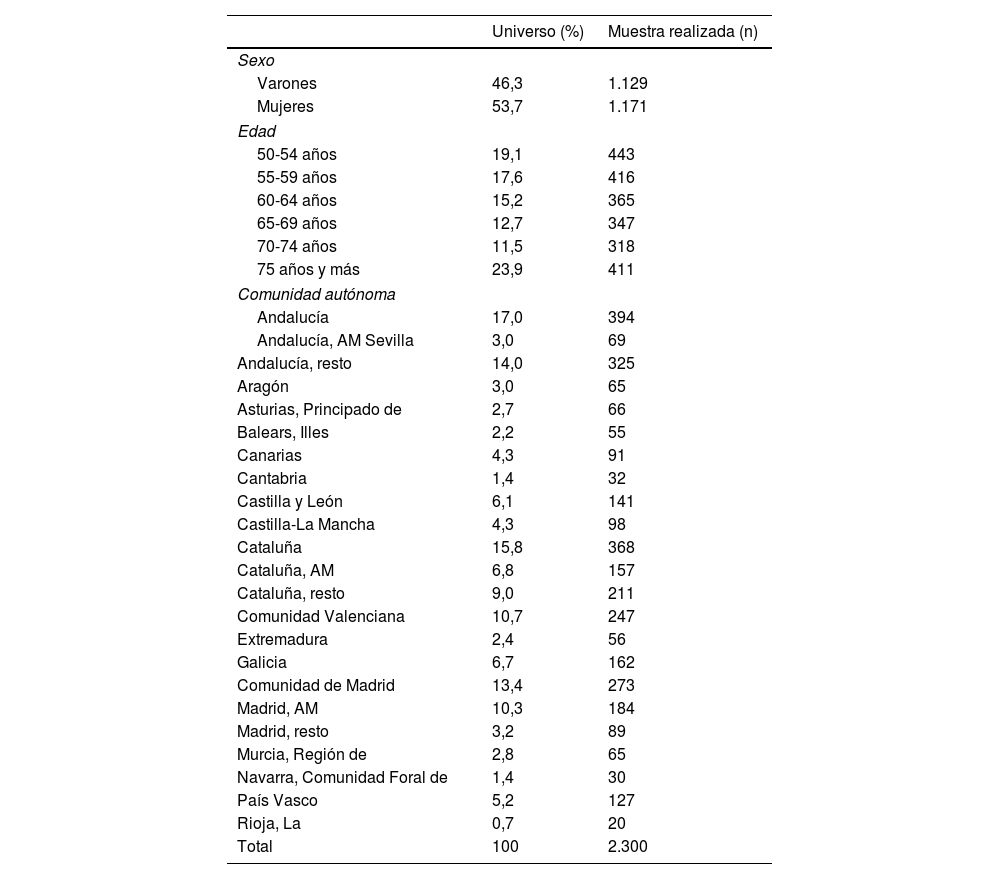Las quejas subjetivas de memoria (QSM) pueden ser una señal inicial de un posterior deterioro de las funciones cognitivas. Sin embargo, no se han publicado estudios poblacionales cubriendo toda España para conocer la prevalencia de las QSM. El objetivo del presente estudio fue conocer la prevalencia de las QSM en la población general residente en España >50 años y, también qué actuaciones se llevaban a cabo al respecto.
Materiales y métodosSe realizaron entrevistas mediante un cuestionario online/Computer Assisted Web Interview (CAWI) a una muestra representativa a nivel nacional >50 años. La encuesta constaba de 34 ítems divididos en 2 bloques. Se consideró presencia de QSM cuando en la pregunta 1 el sujeto contestaba que ‘Sí’ tenía algún problema de memoria.
ResultadosSe entrevistó a 2.300 personas (53,7% mujeres; 23,9% ≥75 años). El 31% contestaron que consideraban que tenían un problema de memoria (sin diferencias entre sexos, media de tiempo con problemas de memoria de 3,0 años). Se observó mayor prevalencia de QSM en ≥75 años (44%). El 90% no incluían ningún alimento específico en su dieta para sus problemas de memoria, y tampoco estaban tomando productos farmacéuticos, complementos de la dieta o suplementos nutricionales (92%). El 78% de los entrevistados con QSM no han consultado a profesionales sanitarios por sus problemas de memoria.
ConclusionesLas QSM tienen una prevalencia considerable en nuestro medio, afectando a casi un tercio de los individuos >50 años. La mayoría de los entrevistados con quejas de memoria no buscó el consejo/recomendación de profesionales sanitarios con respecto a las mismas.
Subjective memory complaints (SMC) might be an early sign of further deterioration in cognitive functions. However, no population studies have been published covering all Spain to determine the SMC prevalence. The objective of the present study was to determine the SMC prevalence in the general population residing in Spain >50 years of age and also which related actions were done.
Materials and methodsInterviews were conducted with a nationally representative sample >50 years of age using an online/computer assisted web interview (CAWI) questionnaire. The survey consisted of 34 items divided into two blocks. Presence of SMC was considered when in question 1 the subject answered that “Yes” he had some memory problem.
ResultsTwo thousand three hundred people (53.7% women; 23.9% ≥75 years old) were interviewed. 31% answered that they considered they had a memory problem (no differences between sexes, mean time with memory problems of 3.0 years). A higher prevalence of SMC was observed in ≥75 years old (44%). 90% did not include any specific foods in their diet for their memory problems, neither were taking any pharmaceuticals, diet supplements or nutritional supplements (92%). 78% of those interviewed with SMC have not consulted health professionals for their memory problems.
ConclusionsSMC are considerably prevalent in our environment affecting almost a third of people ≥50 years of age. Most of the interviewees with SMC did not go to health professionals to manage their SMC.












